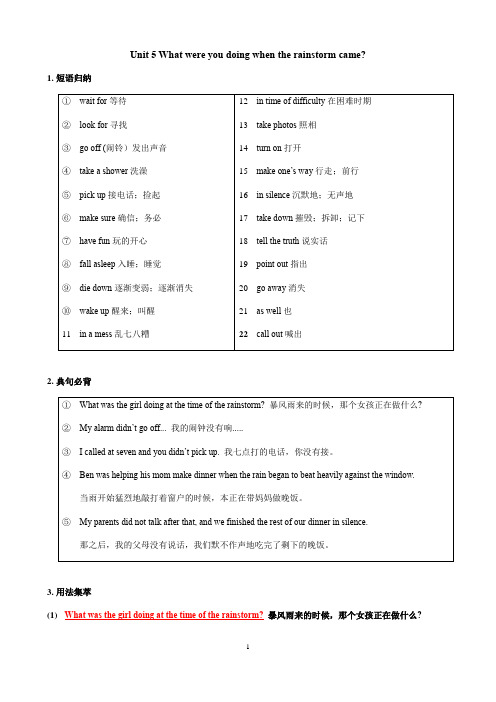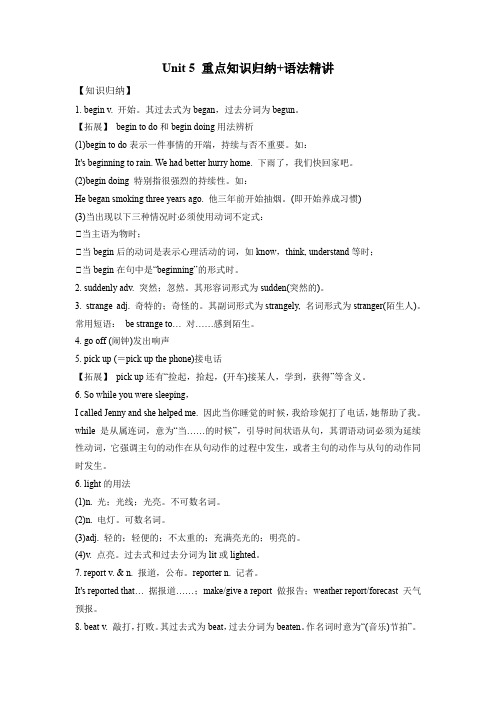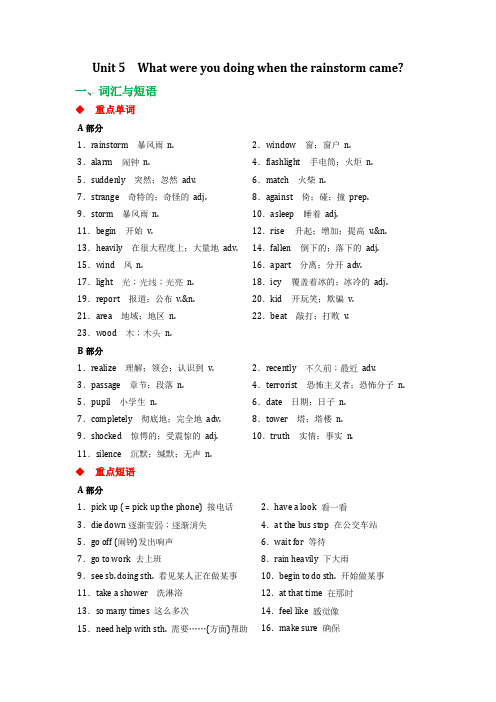人教版八年级下册英语Unit5知识点总结
英语人教版新目标八年级下册知识整理Unit5

【英语】八年级下册教材全梳理(Unit5 If you go to the party you’ll have a great time)知识·巧学生词巧解【词析】音析:字母组合ea读作[]。
义析:a kind of trousers【典句】This pair of jeans is in style.这条牛仔裤很时髦。
【拓展】jeans本身是复数名词,作主语时谓语动词要用复数形式。
take away拿走【词析】形析:take(拿)+away(离开)义析:take sth.from one place to another【典句】Don’t forget to take away your umbrella.别忘了带走你的雨伞。
【拓展】away是副词,当宾语为代词宾格时,一定要放在away的前面。
make a living 谋生【词析】形析:make(做)+a(一种)+living(生活)义析:do sth.for a living【典句】He makes a living as a writer.他靠写作维持生计。
【拓展】使用时,如果说明谋生的手段应在living后加介词by+doing的结构,指“以……为生”。
如:He makes a living by selling books.他以卖书为生。
【词析】音析:a读[],ai读作[e],重音在第二个音节上。
形析:again(又;再次)+st义析:in a direction or course opposite to【典句】We boated against the wind.我们逆风行船。
【拓展】against本身是介词,不能单独作谓语,常和系动词be连用,意为“反对”。
【词析】音析:ch读作[],an读作[],词尾的e不发音。
形析:形近词change(选择)义析:something that happen unusually and luckily【典句】I haven’t had a chance to read my letter.我还没有机会看我的信呢。
人教版八年级下册英语Unit 5 知识点语法归纳总结

Unit 5 What were you doing when the rainstorm came?1.短语归纳2.典句必背3.用法集萃(1)What was the girl doing at the time of the rainstorm?暴风雨来的时候,那个女孩正在做什么?❖本句是特殊疑问句,时态是过去进行时,结构是“What+was/were+主语+doing+其他?”,用于询问某人在过去的某个时间正在做的事情。
例:—What were you doing at nine o’clock yesterday evening? 昨天晚上九点你正在做什么?—I was watching TV at home. 我正在家里看电视。
❖拓展:过去进行时描述过去某个时刻正在发生的动作或存在的状态,结构是“was/ were+动词的现在分词”。
例:When I got home my mother was cooking. 我到家的时候我妈妈正在做饭(2)My alarm didn’t go off... 我的闹钟没有响.....❖go off意为“(闹钟)发出响声”例:My alarm goes off at six every morning. 我的闹钟每天早晨6点响。
❖归纳:go off还有“离开”和“变质”之意。
例:Bob went off to get a drink. 鲍勃拿饮料去了。
Meat goes off quickly in hot weather. 热天肉变质得快。
❖拓展:go的短语(3)I called at seven and you didn’t pick up. 我七点打的电话,你没有接。
❖pick up意为“接电话”。
pick up有如下含义:(4)I called again at eight and you didn’t answer then either. 我八点再打来,你也没接。
Unit 5 重点知识归纳+语法 人教版八年级英语下册

Unit 5 重点知识归纳+语法精讲【知识归纳】1. begin v. 开始。
其过去式为began,过去分词为begun。
【拓展】begin to do和begin doing用法辨析(1)begin to do表示一件事情的开端,持续与否不重要。
如:It's beginning to rain. We had better hurry home. 下雨了,我们快回家吧。
(2)begin doing 特别指很强烈的持续性。
如:He began smoking three years ago. 他三年前开始抽烟。
(即开始养成习惯)(3)当出现以下三种情况时必须使用动词不定式:①当主语为物时;①当begin后的动词是表示心理活动的词,如know,think, understand等时;①当begin在句中是“beginning”的形式时。
2. suddenly adv. 突然;忽然。
其形容词形式为sudden(突然的)。
3. strange adj. 奇特的;奇怪的。
其副词形式为strangely, 名词形式为stranger(陌生人)。
常用短语:be strange to… 对……感到陌生。
4. go off (闹钟)发出响声5. pick up (=pick up the phone)接电话【拓展】pick up还有“捡起,拾起,(开车)接某人,学到,获得”等含义。
6. So while you were sleeping,I called Jenny and she helped me. 因此当你睡觉的时候,我给珍妮打了电话,她帮助了我。
while是从属连词,意为“当……的时候”,引导时间状语从句,其谓语动词必须为延续性动词,它强调主句的动作在从句动作的过程中发生,或者主句的动作与从句的动作同时发生。
6. light的用法(1)n. 光;光线;光亮。
不可数名词。
(2)n. 电灯。
可数名词。
初中英语人教新目标八年级下册Unit 5知识点(重点单词+词形变换+重点短语+重点句型)

八年级英语下册Unit5知识点【Section A】【重点单词】1.alarm n.闹钟2.wind n.风3.storm n.暴风雨4.area n.地域;地区5.suddenly adv.突然6.window n.窗户7.realize v.领会;认识到8.strange adj.奇特的;奇怪的9.heavily adv.在很大程度上;大量地【词形变换】1.begin v.开始→beginning(现在分词)began(过去式)2.heavily adv.在很大程度上;大量地→ heavy(adj.)3.report v.&n.报道;公布→ reporter(n.记者)4.match n.火柴→matches(复数)5.beat v.敲打;打败→beat(过去式)6.asleep adj.睡着的→sleepy(adj.困乏的;欲睡的)sleep(v.睡;睡觉)7.rise v.&n.升起;增加;提高→rose(过去式)8.fall v.倒塌;跌倒;掉落→fell(过去式)fallen(adj.倒下的;落下的)9.icy adj.覆盖着冰的;冰冷的→ice(n.冰)10.kid v.开玩笑;欺骗→kidding(现在分词)【重点短语】1.在暴风雨来的时候at the time of the rainstorm2.在公交站点at the bus stop3.等公交车wait for the bus4.(闹钟)发出响声go off5.洗热水澡take a hot shower6.接电话pick up (=pick up the phone)7.使……靠拢bring ...close together8.室外没有光with no light outside9.在附近街区in the neighborhood10.确保;查明make sure11.逐渐变弱;逐渐消失die down12.醒来;唤醒;叫醒wake up13.一团糟in a mess14.使……分离break...apart15.在困难的时候in times of difficulty【重点句型】1.当暴风雨来临时他正在图书馆里看书。
人教版初二八年级(下)英语第五单元Unit5知识点+习题

Unit 5 What were you doing when the rainstorm came?一、基础知识讲解★语法:过去进行时:⑴用法:表示过去某个时间正在发生的动作。
He was cooking at six last night. 昨天晚上六点,他正在做饭。
I was staying here from March to May last year. 去年从3月到5月,我一直呆在这里。
⑵时间状语:at nine last night / at that time = then / at this time yesterday / when the teacher came in / while he was reading等。
⑶句子结构:was \ were + v. ing⑷基本句型:肯定句:He was cooking at six last night.否定句:He was not cooking at six last night.一般疑问句:Was he cooking at six last night?回答:Yes, he was. / No, he wasn’t.特殊疑问句:What was he doing at six last night?⑸固定结构:①Jim was reading when the teacher came in.②Jim was reading while Kate was watching TV.③Jim came in while Kate was watching TV.⑹区分于一般过去时:He watched TV last night. (过去时间last night, 用一般过去时)He was watching TV at nine last night. (过去时间last night+点时间at nine, 用过去进行时)巩固练习:用所给动词的适当形式填空。
最全面人教版八年级下册英语第五单元知识点归纳总结

Unit 5 What were you doing when the rainstorm came?一、词汇与短语◆重点单词A部分1.rainstorm 暴风雨n.2.window 窗;窗户n.3.alarm 闹钟n.4.flashlight 手电筒;火炬n. 5.suddenly 突然;忽然adv.6.match 火柴n.7.strange 奇特的;奇怪的adj.8.against 倚;碰;撞prep. 9.storm 暴风雨n.10.asleep 睡着adj.11.begin 开始v.12.rise 升起;增加;提高v.&n. 13.heavily 在很大程度上;大量地adv.14.fallen 倒下的;落下的adj. 15.wind 风n.16.apart 分离;分开adv. 17.light 光;光线;光亮n.18.icy 覆盖着冰的;冰冷的adj. 19.report 报道;公布v.&n.20.kid 开玩笑;欺骗v.21.area 地域;地区n.22.beat 敲打;打败v.23.wood 木;木头n.B部分1.realize 理解;领会;认识到v.2.recently 不久前;最近adv. 3.passage 章节;段落n.4.terrorist 恐怖主义者;恐怖分子n. 5.pupil 小学生n.6.date 日期;日子n. 7.completely 彻底地;完全地adv.8.tower 塔;塔楼n.9.shocked 惊愕的;受震惊的adj.10.truth 实情;事实n. 11.silence 沉默;缄默;无声n.◆重点短语A部分1.pick up ( = pick up the phone) 接电话2.have a look 看一看3.die down逐渐变弱;逐渐消失4.at the bus stop 在公交车站5.go off (闹钟)发出响声6.wait for 等待7.go to work 去上班8.rain heavily 下大雨9.see sb. doing sth. 看见某人正在做某事10.begin to do sth. 开始做某事11.take a shower 洗淋浴12.at that time 在那时13.so many times 这么多次14.feel like 感觉像15.need help with sth. 需要……(方面)帮助16.make sure 确保17.with no light outside 外面没有灯光18.help sb. (to) do sth. 帮助某人做某事19.put……over……把……覆盖在……上20.make dinner 做晚饭21.put sth. on the table 把某物放在桌子上22.play a card game 玩纸牌游戏23.beat heavily against the windows 猛烈地敲打着窗户24.get to the place of the accident 到达事故发生地25.have fun 玩得愉快26.wake up 醒来;叫醒27.at first 起初;起先28.in times of difficulty 在困难时29.fall asleep 进入梦乡;睡着30.right away 立刻;马上31.go outside with sb. 和某人一起出去32.in the library 在图书馆33.find sth. in a mess 发现……一片狼藉34.on the street 在大街上35.break sth. apart 把某物折断(或分开)B部分1.in silence 沉默;无声2.in history 在历史上3.take down 拆除;往下拽;记录4.remember doing sth. 记得做过某事5.make one's way 前往;费力地前进6.look out of the window 向窗外看7.the school basketball competition 学校篮球比赛8.have meaning to sb.对某人来说有意义9.walk by 从旁边经过10.point sth. out to sb. 向某人指岀某物11.by the side of the road 在路边12.go away 离开13.at the event 在这次活动中14.as well 也15.be late for 迟到16.call out the winner 宣布获胜者17.on this day 在这一天18.10 minutes ago 十分钟前19.on April 4 在四月四日20.be completely shocked 完全震惊了21.an important event 一次重要的事件22.the rest of 其余的23.on the radio 在收音机上◆重点句子A部分1.What were people doing yesterday at the time of the rainstorm?昨天暴风雨来临时人们正在干什么?2.when the rain storm suddenly came, what were you doing?当暴风雨突然来临时,你正在做什么?3.So while you were sleeping, I called Jenny and she helped me.因此在你睡觉的时候,我打电话给珍妮,她帮了我。
八年级下册人教版英语unit5知识点
八年级下册人教版英语unit5知识点Unit 5 Knowledge Points in Grade 8 of People's Education PressUnit 5 in Grade 8 of People's Education Press English textbook covers a variety of topics. In this article, we will explain the key knowledge points of this unit to help you better understand and learn English.Part 1: Grammar1. The present perfect tenseThe present perfect tense is used to describe past actions or experiences that have a connection to the present. It is formed by using "have/has" and the past participle of the main verb. For example:I have played soccer before. (The action of playing soccer happened in the past, but the speaker's experience of playing soccer has a connection to the present.)2. The past perfect tenseThe past perfect tense is used to describe an action that happened before another action in the past. It is formed by using "had" and the past participle of the main verb. For example:She had finished her homework before she watched TV. (Finishing homework happened before watching TV in the past.)3. Passive voiceThe passive voice is used to show that the subject of the sentence is receiving the action, rather than doing the action. It is formed by using "be" and the past participle of the main verb. For example:The cake was made by Tom. (The subject "the cake" is receiving the action of being made by Tom.)Part 2: Vocabulary1. Adjectives for describing personalitiesIn unit 5, you will learn about various adjectives that can be used to describe personalities, such as:- Confident- Responsible- Outgoing- Shy- Friendly- Creative2. Phrasal verbsPhrasal verbs are idiomatic phrases that consist of a verb and one or more prepositions or adverbs. In unit 5, you will learn about some common phrasal verbs, such as:- Look up (to search for information)- Put on (to wear)- Take off (to remove)- Get along (to have a good relationship with someone)Part 3: Reading and Writing1. Writing a narrative paragraphIn unit 5, you will learn how to write a narrative paragraph, which tells a story or an event. A narrative paragraph should have a clear beginning, middle, and end, as well as detailed descriptions and sensory language to engage the reader.2. Reading comprehension strategiesReading comprehension strategies are techniques that help you better understand what you are reading. In unit 5, you will learn about some important strategies, such as:- Predicting- Visualizing- Summarizing- Asking questions- Making connectionsConclusionUnit 5 in Grade 8 of People's Education Press English textbook covers a diverse range of topics, including grammar, vocabulary, reading, and writing. By mastering the key knowledge points of this unit, you will have a better understanding of English and be able to communicate more effectively.。
(精品)人教版八年级英语下Unit5知识点讲解
读书。
Jim came in while Kate was watching TV. 在凯特正在看电视的时候,吉姆进来了。 ⑹ 请比较
He watched TV last night.(过去时间 last night, 用一般过去时)
He was watching TV at nine last night. ( 过去时间 last night+点时间 at nine, 用过去进 行时 )
A. was seeing
B. is reading
C. was reading
【2013 黑龙江齐齐哈尔 3】 What ____ you _____ when the captain came in?
A. are; doing
B. did; do
C. were; doing
巩固练习:用所给动词的适当形式填空
Unit5 What were you doing when the rainstorm came?
Section A
1. What were people doingyesterdayat the time of the rainstorm? 昨天当暴风雨来临
的时候人们正在做些什么?
【解析 1】过去进行时
⑷ 过去进行时的四个基本句型
肯定句
He was cooking at six last night.
否定句
He was not cooking at six last night.
一般疑问句 Was he cooking at six last night?
两回答
Yes, he was.N/ o, he wasn ’ t.
6. __________________you __________________(have) supper at that time?
人教版八年级下册英语Unit5知识点总结
人教版八年级下册英语Unit5知识点总结一、语法知识点A部分知识点1.过去进行时❶ 去进行时的构成及用法过去进行时由“助动词(was/were)+动词-ing”构成,表示在过去某一时刻或某一时间段正在进行的动作。
这一特定的过去时间除有上下文暗示以外,一般用过去的时间状语来表示。
如:then, at that time, at this time yesterday, at 10:00 yesterday morning, all right以及when/while从句等。
❶ 表示过去时间点正在进行的动作。
此时常伴明确的过去时间点等。
eg:She was reading a book at this time yesterday.昨天这个时候她正在看书。
(过去时间点正在进行的动作)I was watching TV then. 那时我正在看电视。
(过去时间点正在进行的动作)❶ 表示过去的某个阶段持续的动作。
eg:She was watching TV when the phone rang.(过去一段时间内持续的动作)她正在看电视,这时电话铃响了。
❶ 表示这一阶段反复发生的动作,带有褒贬感情色彩。
此时常伴有频度副词always等。
eg:The girl was always changing her mind.(过去反复发生的动作,带有感情色彩)这个女孩老是改变主意。
❶ 表示过去动作延迟到以后发生,即用过去进行表过去将来,此类动词是一些位置的变化的词。
eg:He told me that he was going soon.(过去进行表将来)他告诉我他很快就要走了。
❶ 过去进行时的一般疑问句句型:Be(Was/Were)+主语+现在分词+其他?肯定回答:Yes,主语+be(was/were).否定回答:No,主语+be(was/were) not.eg:--Were you cooking at that time? 那时,你在做饭吗?--Yes, I were.是的。
人教版英语八年级下册第五单元知识点总结
人教版英语八年级下册Unit 5What were you doing when the rainstorm came?eful expressions.1.at the time of ...在...的时候2.wait for the bus at the bus stop在公交车站等车3.go off发出响声4.take a hot shower洗热水澡5. begin to rain heavily开始下大雨6.miss the bus误了车7.pick up接电话9. strong winds强风11.a heavy rainstorm一阵强风暴雨13. make sure确保15.play a card game玩纸牌17. fall asleep入睡19.wake up醒来21. fallen trees倒树23.join sb加入某人25.help each other彼此相互帮助27.take the car to the car wash送车去洗29.a car accident车事故31.have a look (at...)看33.the heavy snow大雪35. by the side of the road在马路边上37.make one way (to...)前往...39. in history在历史上41.over 50超过50岁43.at that time在那时45.be completely shocked完全被震惊了47. in silence安静地49.have meaning to sb对某人有意义51.look out of向外面看去53.tell the truth讲实话8.bring people closer致使人们更严紧10.black clouds黑云12.put pieces of wood over the windows将木头板覆盖在窗户上14.beat heavily agianst the windows利害的敲击着窗户16. at first刚开始18.die down逐渐消失20.find the neighborhood in a mess发现小区一团遭22. broken windows破窗户24. break ...apart使..支离破碎26. in times of difficulty:在困难时期28.listen to the radio听收音机30. the place of the accident事故发生地32.be in bad shape形状不佳34.Are you kidding?你开玩笑了?36. walk by路过38. the news of important events重大事件的洗牌40.on this day在这一天42. a school pupil小学生44.hear the news on the radio在收音机上收听消息46.the rest of剩余的...48.be taken down by terrorists被恐怖分子摧毁50.remember doing sth记得做过了某事52.be shocked to do sth做某事感到震惊54.not everyone并非每个人55. get killed=be killed被杀56.have trouble/problems/difficulty doing sth做某事有困难57.be important to对某人严重58.point sth out to sb向某人指出59.stop breathing停止呼吸60. call out the winner大声喊出赢家II. Key sentences1.---What was she doing at the time of the rainstorm? ---She was doing her homework.2.-What were you doing when the rainstorm came?-I was taking a shower when the rainstorm came.3.While Linda was sleeping,Jenny was helping Mary with her homework.4.With no light outside,it felt like midnight.5.Ben’s dad was putting p ieces of wood over the windows while his mom was making sure theflashlights and the radio were working.6.Ben was helping his mom make dinner when the rain began to beat heavily against the windows.7.He finally fell asleep when the wind was dying down at around 3:00 a.m.8.Although some people may not remember who killed him,they remember what they were doingwhen they heard the news.9.My parents were completely shocked.My parents did not talk after that and we finished the restof our dinner in silence.10.Even the date-September 11,2002-has meaning to most Americans.。
- 1、下载文档前请自行甄别文档内容的完整性,平台不提供额外的编辑、内容补充、找答案等附加服务。
- 2、"仅部分预览"的文档,不可在线预览部分如存在完整性等问题,可反馈申请退款(可完整预览的文档不适用该条件!)。
- 3、如文档侵犯您的权益,请联系客服反馈,我们会尽快为您处理(人工客服工作时间:9:00-18:30)。
Unit5 知识点Section A1a—2d1. 暴风雨来临时at the time of the rainstorm 2、在公交车站at the bus stop3. 等公交车wait for the bus4. 忙于做某事be busy doing sth.5. 忙于某事be busy with sth.6.(闹钟)发出响声go off7. 醒来晚了wake(woke) up late 8. 洗热水澡take a hot shower9. 开始下大雨begin (began) to rain heavily 10. 雨/雪下的大rain/ snow heavily/ hard 11.跑向公交车站run to the bus stop 12. 发现某人正在做某事see sb. doing 13. 接电话pick up=answer the phone 14. 在厨房in the kitchen15. 在那时at that time 16. 这么多次so many times1. 当暴风雨来的时候人们正在做什么?What were people doing at the time of the rainstorm?2. 当暴雨来的时候那个女孩正在写作业。
The girl was doing her homework when the rainstorm came.3. 我是如此忙着找雨伞以至于没有看到一辆车过来了。
I was so busy looking for the umbrella that I didn’t see a car coming.4. 我的闹钟没有响,因此我醒来晚了。
My alarm didn’t go off so I woke up late.5. 当开始下大雨时我正在等公交车。
I was waiting for the bus when it began to rain heavily.6. 我跑向车站但我仍然错过了公交车。
I ran to the bus stop but I still miss the bus.7.昨天晚上七点钟我在厨房帮我妈妈。
I was helping my mom in the kitchen at seven last night.8. 当你打电话时我正在洗澡。
When you called, I was taking a shower.9. 当你在睡觉时,我给詹妮打了电话,她帮助了我。
While you were sleeping, I called Jenny and she helped me. 3a-4c1. 狂风strong wing2.感觉像;想要feel like (doing)3. 一块木头a piece of wood4. 确保make sure5. 首先at first6. 入睡fall asleep7. 逐渐变弱die down8. 醒来wake up 9. 一团糟in a mess 10. 在困难时期in times of difficulty11.听收音机listen to the radio 12. 立刻,马上right away/ at once13. 看一看have a look14. 事故地点the place of the accident15. 因为,由于because of1. With no light outside, it felt like midnight. 外面没有光亮,感觉就像黑夜一样2. It was hard for them to have fun with a serious storm happening outside.外面的暴风雨太大了,他们很难玩的开心。
3. Ben’s dad was putting pieces of wood over the windows while his mom was makingsure the flashlights and radio were working.Ben的爸爸正在把木片挡在窗户上,同时他的妈妈在确认手电筒和收音机都能正常使用。
4. Ben was helping his mom make dinner when the rain began to beat heavily against the windows. 当雨水开始重重地敲打窗户时,本正帮着妈妈做晚饭。
5. He finally fell asleep when the wind was dying down at around three a.m.大约在凌晨三点风逐渐减弱的时候,他总算睡着了。
6. Although the storm broke many things apart, it brought families and neighbors closertogether.尽管暴风雨毁坏了许多东西,但它使家庭和邻里之间的关系更近了。
7. How can we help each other in times of difficulty?在困难时期我们怎样互相帮助?8. 当我正在做我的早餐的时候,我的哥哥正在听收音机。
While I was making my breakfast, my brother was listening to the radio.9. 当我正在吃的时候,广播新闻谈论了一场我们家附近的车祸。
While I was eating, the radio news talked about a car accident near our home.10. 我哥哥和我立即出门去看了看。
My brother and I went out right away to have a look.11. 当我们到达事故现场,汽车由于撞到了一棵树而严重变形。
When we got to the place of the accident, the car was in bad shape from hitting a tree.12. 因为前一晚的大雪,道路结冰了。
The roads were icy because of the heavy snow from the night before.13.上周日上午九点你在做什么?What were you doing at nine o’clock last Sunday morning?14. 你在开玩笑You’re kidding!别自欺欺人了。
Don’t kid yourself.Section B1. 在路边by the side of the road2. 等有人经过wait for someone to walk by3. 前往;在去某处的路上,费力地前进make one’s way to sp.4.难怪no wonder5. 历史上重大事件的消息the news of important events in history6. 被杀害be killed7. 其余的,剩下的the rest of8. 沉默,无声in silence9. 拆除,往下拽;记录take down 被某人拆除be taken down by sb.10. 对某人有意义have meaning to sb.11. 记得/忘记做某事remember/ forget to do sth.12. 记得/忘记做过某事remember/ forget doing sth. 13. 起初;起先at first最后at last14. 向窗外看look out of the window15. 老实说;说实在的t o tell the truth=to be honest 16. 指出point out 17. 在六年级in the sixth grade=in Grade Six句子1.学校篮球比赛开始时凯特仍在上学的路上。
When the school basketball competition started, Kate was still making her way to school.2. 直到下车时kitty才意识到她的书包还在家。
Kitty didn’t realize that her bag was still at home until she got off.3. 人们经常记得当他们听到历史上重大事件的消息时他们在做什么。
People often remember what they were doing when they heard the news of important events in history.4. 当我们听到电台新闻的时候我们正在厨房吃晚饭。
We were eating dinner in the kitchen when we heard the news on the radio.5. 我的父母完全震惊了。
My parents were completely shocked.他的父母听到这个消息很震惊。
His parents were shocked to hear the news.6. 之后我的父母没再讲话,我们在沉默中吃完了晚饭。
My parents did not talk after that, and we finished the rest of our dinner in silence.剩下的肉坏了。
The rest of meat is bad.其余的工人们仍然正在努力地工作着。
The rest of workers are still working hard.7. 即便是2001年9月11日这个日期也对大多美国人有着意义。
Even the date — September 11, 2001 — has meaning to most Americans.这件礼物对我有特别的意义。
The gift has special meaning to me.8. 我是如此害怕以至于在那之后我几乎无法清晰地思考。
I was so scared that I could hardly think clearly after that.在那之后我无法清晰地思考因为我太害怕了。
I had trouble thinking clearly after that because I was very afraid.9. 当我指给我朋友看时它消失了。
When I pointed it out to my friend, it went away.报告中有几处错误,请你把它们指出来好吗?There are several mistakes in the report, could you please point them out?10.这是我一生最开心的日子。
